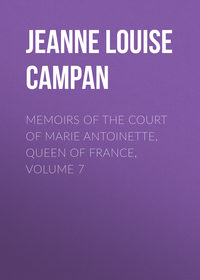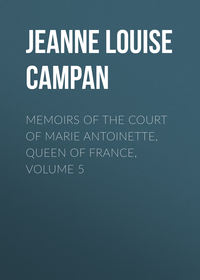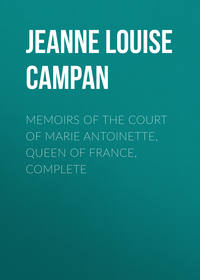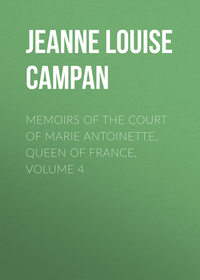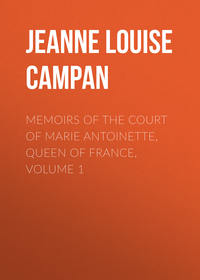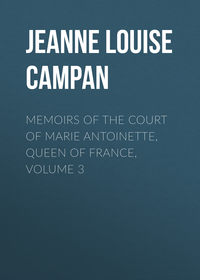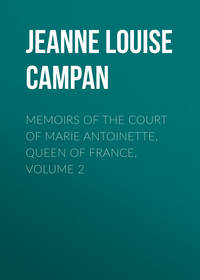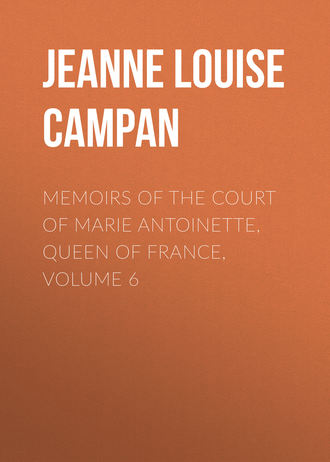 полная версия
полная версияMemoirs of the Court of Marie Antoinette, Queen of France, Volume 6
I borrowed clothes, and went with my sister to the Feuillans—[A former monastery near the Tuileries, so called from the Bernardines, one of the Cistercian orders; later a revolutionary club.]—We got there at the same time with M. Thierry de Ville d'Avray, the King's first valet de chambre. We were taken into an office, where we wrote down our names and places of abode, and we received tickets for admission into the rooms belonging to Camus, the keeper of the Archives, where the King was with his family.
As we entered the first room, a person who was there said to me, "Ah! you are a brave woman; but where is that Thierry, [M. Thierry, who never ceased to give his sovereign proofs of unalterable attachment, was one of the victims of the 2d of September.—MADAME CAMPAN.] that man loaded with his master's bounties?"—"He is here," said I; "he is following me. I perceive that even scenes of death do not banish jealousy from among you."
Having belonged to the Court from my earliest youth, I was known to many persons whom I did not know. As I traversed a corridor above the cloisters which led to the cells inhabited by the unfortunate Louis XVI. and his family, several of the grenadiers called me by name. One of them said to me, "Well, the poor King is lost! The Comte d'Artois would have managed it better."—"Not at all," said another.
The royal family occupied a small suite of apartments consisting of four cells, formerly belonging to the ancient monastery of the Feuillans. In the first were the men who had accompanied the King: the Prince de Poix, the Baron d'Aubier, M. de Saint-Pardou, equerry to Madame Elisabeth, MM. de Goguelat, de Chamilly, and de Hue. In the second we found the King; he was having his hair dressed; he took two locks of it, and gave one to my sister and one to me. We offered to kiss his hand; he opposed it, and embraced us without saying anything. In the third was the Queen, in bed, and in indescribable affliction. We found her accompanied only by a stout woman, who appeared tolerably civil; she was the keeper of the apartments. She waited upon the Queen, who as yet had none of her own people about her. Her Majesty stretched out her arms to us, saying, "Come, unfortunate women; come, and see one still more unhappy than yourselves, since she has been the cause of all your misfortunes. We are ruined," continued she; "we have arrived at that point to which they have been leading us for three years, through all possible outrages; we shall fall in this dreadful revolution, and many others will perish after us. All have contributed to our downfall; the reformers have urged it like mad people, and others through ambition, for the wildest Jacobin seeks wealth and office, and the mob is eager for plunder. There is not one real patriot among all this infamous horde. The emigrant party have their intrigues and schemes; foreigners seek to profit by the dissensions of France; every one has a share in our misfortunes."
The Dauphin came in with Madame and the Marquise de Tourzel. On seeing them the Queen said to me, "Poor children! how heartrending it is, instead of handing down to them so fine an inheritance, to say it ends with us!" She afterwards conversed with me about the Tuileries and the persons who had fallen; she condescended also to mention the burning of my house. I looked upon that loss as a mischance which ought not to dwell upon her mind, and I told her so. She spoke of the Princesse de Tarente, whom she greatly loved and valued, of Madame de la Roche-Aymon and her daughter, of the other persons whom she had left at the palace, and of the Duchesse de Luynes, who was to have passed the night at the Tuileries. Respecting her she said, "Hers was one of the first heads turned by the rage for that mischievous philosophy; but her heart brought her back, and I again found a friend in her."
[During the Reign of Terror I withdrew to the Chateau de Coubertin, near that of Dampierre. The Duchesse de Luynes frequently came to ask me to tell her what the Queen had said about her at the Feuillans. She would say as she went away, "I have often need to request you to repeat those words of the Queen."—MADAME CAMPAN.]
I asked the Queen what the ambassadors from foreign powers had done under existing circumstances. She told me that they could do nothing; and that the wife of the English ambassador had just given her a proof of the personal interest she took in her welfare by sending her linen for her son.
I informed her that, in the pillaging of my house, all my accounts with her had been thrown into the Carrousel, and that every sheet of my month's expenditure was signed by her, sometimes leaving four or five inches of blank paper above her signature, a circumstance which rendered me very uneasy, from an apprehension that an improper use might be made of those signatures. She desired me to demand admission to the committee of general safety, and to make this declaration there. I repaired thither instantly and found a deputy, with whose name I have never become acquainted. After hearing me he said that he would not receive my deposition; that Marie Antoinette was now nothing more than any other Frenchwoman; and that if any of those detached papers bearing her signature should be misapplied, she would have, at a future period, a right to lodge a complaint, and to support her declaration by the facts which I had just related. The Queen then regretted having sent me, and feared that she had, by her very caution, pointed out a method of fabricating forgeries which might be dangerous to her; then again she exclaimed, "My apprehensions are as absurd as the step I made you take. They need nothing more for our ruin; all has been told."
She gave us details of what had taken place subsequently to the King's arrival at the Assembly. They are all well known, and I have no occasion to record them; I will merely mention that she told us, though with much delicacy, that she was not a little hurt at the King's conduct since he had quitted the Tuileries; that his habit of laying no restraint upon his great appetite had prompted him to eat as if he had been at his palace; that those who did not know him as she did, did not feel the piety and the magnanimity of his resignation, all which produced so bad an effect that deputies who were devoted to him had warned him of it; but no change could be effected.
I still see in imagination, and shall always see, that narrow cell at the Feuillans, hung with green paper, that wretched couch whence the dethroned, Queen stretched out her arms to us, saying that our misfortunes, of which she was the cause, increased her own. There, for the last time, I saw the tears, I heard the sobs of her whom high birth, natural endowments, and, above all, goodness of heart, had seemed to destine to adorn any throne, and be the happiness of any people! It is impossible for those who lived with Louis XVI. and Marie Antoinette not to be fully convinced, while doing full justice to the King's virtues, that if the Queen had been from the moment of her arrival in France the object of the care and affection of a prince of decision and authority, she would have only added to the glory of his reign.
What affecting things I have heard the Queen say in the affliction caused her by the belief of part of the Court and the whole of the people that she did not love France! How did that opinion shock those who knew her heart and her sentiments! Twice did I see her on the point of going from her apartments in the Tuileries into the gardens, to address the immense throng constantly assembled there to insult her. "Yes," exclaimed she, as she paced her chamber with hurried steps, "I will say to them Frenchmen, they have had the cruelty to persuade you that I do not love France!—I! the mother of a Dauphin who will reign over this noble country!—I! whom Providence has seated upon the most powerful throne of Europe! Of all the daughters of Maria Theresa am I not that one whom fortune has most highly favoured? And ought I not to feel all these advantages? What should I find at Vienna? Nothing but sepulchres! What should I lose in France? Everything which can confer glory!"
I protest I only repeat her own words; the soundness of her judgment soon pointed out to her the dangers of such a proceeding. "I should descend from the throne," said she, "merely, perhaps, to excite a momentary sympathy, which the factious would soon render more injurious than beneficial to me."
Yes, not only did Marie Antoinette love France, but few women took greater pride in the courage of Frenchmen. I could adduce a multitude of proofs of this; I will relate two traits which demonstrate the noblest enthusiasm: The Queen was telling me that, at the coronation of the Emperor Francis II., that Prince, bespeaking the admiration of a French general officer, who was then an emigrant, for the fine appearance of his troops, said to him, "There are the men to beat your sans culottes!" "That remains to be seen, Sire," instantly replied the officer. The Queen added, "I don't know the name of that brave Frenchman, but I will learn it; the King ought to be in possession of it." As she was reading the public papers a few days before the 10th of August, she observed that mention was made of the courage of a young man who died in defending the flag he carried, and shouting, "Vive la Nation!"—"Ah! the fine lad!" said the Queen; "what a happiness it would have been for us if such men had never left off crying, 'Vive de Roi!'"
In all that I have hitherto said of this most unfortunate of women and of queens, those who did not live with her, those who knew her but partially, and especially the majority of foreigners, prejudiced by infamous libels, may imagine I have thought it my duty to sacrifice truth on the altar of gratitude. Fortunately I can invoke unexceptionable witnesses; they will declare whether what I assert that I have seen and heard appears to them either untrue or improbable.
ETEXT EDITOR'S BOOKMARKS:
A man born solely to contradict
Alas! her griefs double mine!
He is afraid to command
His ruin was resolved on; they passed to the order of the day
King (gave) the fatal order to the Swiss to cease firing
La Fayette to rescue the royal family and convey them to Rouen
Prevent disorder from organising itself
The emigrant party have their intrigues and schemes
There is not one real patriot among all this infamous horde
Those who did it should not pretend to wish to remedy it


